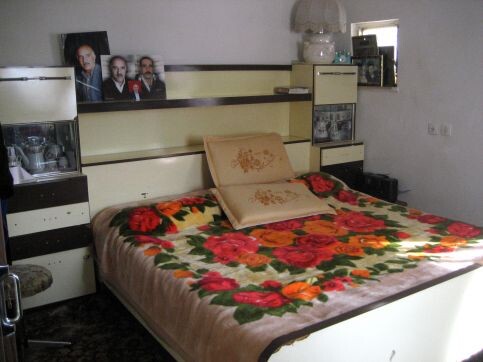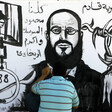The Electronic Intifada Hebron 3 February 2011

Subhya Qawasme, whose husband Amr was murdered by Israeli soldiers in front of her.
“I sleep one night and then I don’t sleep because I am afraid something will happen. They killed him in front of me,” Subhya Qawasme explained, while fixing her intensely green eyes on me, and gesturing with her large, muscular hands.
On 7 January, five Israeli soldiers invaded Subhya’s home in the occupied West Bank city of Hebron. Her husband, Amr, was shot to death while he was sleeping in their bed as Subhya prayed beside him. Amr Qawasme was 66 years old. He was a former construction worker, a father of 12 and a grandfather of 37.
The Israeli military quickly admitted that Amr’s murder was “a mistake,” that his killing was a botched attempted extra-judicial execution mission.
Killed without warning
On the night of the murder, Israeli soldiers unlocked the front door to the Qawasme house at around 3am and entered the house quietly.
“I had woken up to some crashing or noise outside, and assumed it was just dogs, but I got up anyway to pray,” Subhya told The Electronic Intifada.
Subhya and Amr’s bedroom, which is so small that the bed takes up more than half of the space, is now pristinely clean. But Subhya said it took the family four hours to clean up the spilled blood.
When this writer entered the room, all appeared completely normal until Subhya removed a pillow to reveal the concentration of bullet holes on the headboard, where her husband was sleeping when he was shot 13 times by two Israeli soldiers.
Subhya walked through her motions, re-enacting the scene. She rose from her and Amr’s bed, turned on the light and commenced her early morning prayer, facing Mecca with her back to the bedroom door. While praying, she explained, the Israeli soldiers appeared in her bedroom. Subhya, shocked and terrified, had watched as a solider immediately began shooting her husband.
“Blood was all over the walls,” Subhya remembered, as she waved across the now unmarked wardrobe.
After the shooting stopped, the soldiers demanded from Subhya that she show them her husband’s identification. With a gun pointed at her, she walked over to where her husband’s destroyed body lay, to retrieve his ID. Only after they saw it did they realize they had not come to the right home.
The soldiers were looking for Wael al-Bitar, one of the six Hamas-affiliated men who had been released from prison a day earlier by a direct order from Palestinian Authority President Mahmoud Abbas. That night, the Israeli military re-arrested five of the six men who had been released, including al-Bitar.
Despite the army’s admission of a mistake, there is no sign that anybody will redress for the fault. “Mistakes” or any murder of Palestinians have gone almost entirely unpunished by the Israeli military and government.
Subhya recounted the events of that night with a torrent of exact and certain articulation, hardly taking a break to breathe. After she got through it, her voice broke and her eyes filled with tears. “I can’t sleep because I only remember what happened here,” she said as we sat in her bedroom.
Subhya said her family and friends encouraged her to get a new bed as a means of dealing with the horrific memory of that night, but she insists on keeping it, along with the same blanket that was tattered by the bullets.

Amr and Subhya Qawasme’s bedroom, now cleaned of Amr’s blood.
Extrajudicial killings
Following the murder of Qawasme, international and Israeli news headlines announced the Israeli military had killed the “wrong man,” yet went on to report that the Israeli military had conducted the raids only to re-arrest the six Hamas-affiliated men. One example of this can be found in a news report by Reuters, which stated that “The man was shot as troops swooped on houses in the occupied West Bank to re-arrest five members of the Islamist Hamas group who had been freed from Palestinian jails just the day before” (“Israeli troops kill wrong man in Hamas raid,” 7 January 2011).
No mention of the plan to assassinate these men was declared in any public statements from the military. According to the Ramallah-based human rights group Al-Haq, however, the slaying of Amr reveals that the incident was a failed extra-judicial killing attempt.
Since the start of the second intifada in September 2000, the Israeli government has pursued a policy of extrajudicial killings, in which the military executes Palestinians with no judicial process.
Since 2000, more than six hundred Palestinians in the West Bank and Gaza Strip have been killed in this manner, according to the Israeli human rights group B’Tselem. Furthermore, despite a 2006 Israeli high court ruling that aimed to limit the military’s policy of extrajudicial executions, Al-Haq reports that there has been no practical reduction of this deadly tactic in the occupied West Bank and Gaza Strip.
Wesam Ahmad, an Al-Haq spokesperson, told The Electronic Intifada that when Israeli soldiers invaded the Qawasme family home, “all indicators are they went in intending to kill. Once they realized they had made a mistake, everything changed.”
Evidently, the military aborted their plan to kill Wael al-Bitar after executing the wrong man.
Ahmad explained that Al-Haq sees this incident as part of the larger Israeli policy of targeted assassinations and anticipates that despite promises to conduct an internal investigation, there will be no accountability.
Impunity
Al-Haq’s doubts towards the Israeli investigation were affirmed on 19 January. The Israeli military announced the findings of its investigation headed by GOC Central Command, Major General Avi Mizrahi. Mizrahi found that the soldier who initiated shooting Amr had reason to feel threatened, due to a “suspicious movement” by the victim, and therefore he will not be discharged. However, in what can only be described as an arbitrary scapegoat, Mizrahi has terminated the army career of the second solider who began shooting, describing his behavior as “unprofessional.” Thus, in keeping with the policy, military investigation has failed to condemn murdering innocent civilians.
Impunity for Israeli soldiers manifested itself in policy at the start of the second intifada. In 2000, the Judge Advocate General’s Office categorized the situation in the West Bank and Gaza Strip as an “armed conflict,” making any investigation into homicides of civilians the exception, as B’Tselem documents in its September 2010 report “By Void of Responsibility”.
The Hamas prisoners
The PA’s incarceration of the Hamas-affiliated men, who were the target of the lethal raid, has itself come under wide condemnation.
The wanted Hebron men had been arrested by Palestinian Authority security forces in September and October of 2008, and had been held in a PA prison for more than two years without charges. In January and February of 2010, the Palestinian High Court ordered four of the prisoners’ release, yet they remained in detention. Their overdue release only came as a response to mounting pressure on Abbas after the men commenced a hunger strike in November 2010.
According to the West Bank-based prisoner-rights group Addameer, the men were in very weak condition upon their release on 6 January as their hunger strike had lasted between 45 and 50 days and they had not yet received medical attention. Their arrests on 7 January exacerbated their poor health. Wael al-Bitar, for example, was denied food until the evening of 7 January, when he arrived at Ramleh Prison in Israel, as a 10 January 2011 press release from the Palestinian prisoner rights group Addameer reports.
According to Addameer, three of the prisoners have been moved to Ofer Prison, one remains in Kishon/al-Jalameh Detention Center and one has been placed in administrative detention for six months.
According to Addameer, it is not uncommon for a Palestinian political prisoner to be re-arrested by one authority after the other has released him.
“There is no secret that there is security coordination between the Palestinian side and the Israeli side,” Ahmad told The Electronic Intifada. “But this shows that the Palestinians have no real control of security on the ground and cannot secure the lives of Palestinians on the ground.”
On the day of Amr’s murder, a funeral was held in Hebron with a reported 4,000 in attendance. Ambassadors from Belgium, Egypt and Argentina were present at the funeral and individually paid their respects to Qawasme’s family afterwards.
About the ceremony, Subhya said, “It was the most beautiful funeral I had seen … thousands of people were in the streets — Hamas, Fatah, everyone. It made me very happy, and it made me feel calm.”
In light of the numerous innocent men and women whose lives have been cut short by the Israeli military, a “mistake” is hardly distinctive. Furthermore, characterizing Amr’s death as such suggests that Israel’s killing of somebody else could have been legitimate.
Subhya and her family hope to bring the soldiers to trial. Her son Rajae Qawasme said, “We want to raise the voice of all Palestinians to show the crimes of Israel against innocent Palestinians.”
All images by Charlotte Silver.
Charlotte Silver is a journalist based in the West Bank. She can be reached at charlottesilver A T gmail D O T com.





